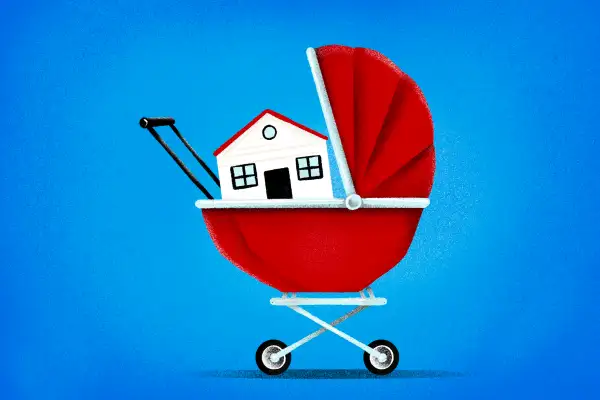5 Ways Your Finances Instantly Change When You Buy a House

At 33, I’ve now logged two stints as a new homeowner, and let me tell you: neither was easy.
The first time was just after tying the knot—bright-eyed and ready to take that next step in my seemingly “adult” life. The second? That was with two 2-year-olds in tow and a whole lot less sleep. (We rented for a bit after moving back to our hometown of Houston. Having newborn twins was rough, guys.)
Though the scenarios were completely different, both turned our finances on their head. We used up huge portions of our savings, saw our credit take a hit, and had to learn to budget differently (well, budget at all) to account for the new costs.
Are you considering making the move from renter to homeowner? Here are five financial changes you’ll want to prep for.
Your credit score will drop.
If you’ve been eyeing a home purchase, then you’ve probably been keeping a close watch on your credit score. You might have even been actively working to improve it. Unfortunately, once you get a mortgage, that score’s going to drop—anywhere from 11 to 40 points, according to a study by LendingTree.
“Don’t be shocked when your credit score drops like a stone,” says Howard Dvorkin, chairman of Debt.com. “After all, you just took on a lot of new debt.”
Fortunately, the drop is only temporary. LendingTree’s study shows it takes about nine months for scores to recover. After that, if you’ve paid your mortgage on time each month, it could actually give your score a boost.
“If you take out a mortgage and make consistent, monthly payments, that can have a tremendous positive influence on your credit score and history,” says Tony Wahl, director of operations at credit score monitoring company Credit Sesame. “One of the lesser-known factors that influences your credit score is demonstrating the ability to handle different types of credit—credit cards, auto loans, mortgages. It’s really the most important difference that you'll see when comparing the credit of someone in the 700 range to someone in the 800-plus range.”
You’ll have more costs.
As a renter, you likely had only a handful of costs—your rent, the cable bill and maybe the utilities and water, depending on where you live. As a homeowner, a lot more is added to the till.
“While the mortgage and the homeowner's insurance policy will be the headline costs, there are lots of additional costs that new homeowners may not be considering,” says Matthew Schwartz, a certified financial planner with Great Waters Financial. “Once you buy a home, the upkeep, maintenance and improvements are all up to you.”
That last bit includes a whole host of items—things like regular pest control, lawn maintenance, the costs of air filters and HVAC tune-ups and more. You’ll also have property taxes and possible homeowner association dues.
If your property is bigger than your rental was, there are most costs there, too. It will likely mean higher electric, water and gas bills, and you’ll probably need more insurance coverage. Depending on where your property’s located, flood insurance may also be required.
Your savings will become more important than ever.
Even if you made the bare minimum down payment, you’re probably out quite a bit of cash after buying a home. On an FHA loan, for example, the minimum is 3.5%—so $7,000 on a $200,000 home. If you made a larger down payment on the same home—say 20%, then your savings took a $40,000 hit.
A scant savings account is a huge risk when you’re a homeowner. Not only does homeownership come with more recurring costs than renting, but you’re also more likely to have unexpected expenses—sudden repairs or breakdowns that you didn’t quite account for. That makes building those savings back up critical.
“The average homeowner spends about $2,000 a year on home maintenance and repairs,” says Jackie Boies, senior director of housing services at Money Management International, a nonprofit credit counseling agency. “It’s likely that one day your home will need a new roof, HVAC replacement, plumbing repair or something. Unlike when you were a renter, these costs are ones you’ll have to be prepared to pay.”
Schwartz recommends keeping at least three to six months’ worth of expenses—including your mortgage payment, utilities and other regular bills—in a savings account to be safe.
“Having an emergency reserve is essential when owning a home,” he says. “There will be surprises, and some can be very costly.”
Late payments won’t be an option—ever.
Being a little late on your rent probably wasn’t a big deal. You’d send your landlord a text, tell him you’ll have it tomorrow, and the problem was solved—no harm, no foul. Homeownership doesn’t work that way, at least if you want to keep a roof over your head.
Missing a mortgage payment can be “catastrophic,” says Dvorkin. “Once you move into your own home, you better keep a monthly budget—or you might not be in that home for long.” If you’re new to budgeting, there are several apps out there that can help. (I personally use Mint and love it—its credit score updates are a game-changer.)
It sounds scary, but just one late mortgage payment can have serious consequences. Though most lenders have a grace period—usually around two weeks—if your payment is not in by the time that period is up, you’ll be charged a late fee. The overdue payment will also be reported to the credit bureaus, which will ding your credit score. Once you’re three months behind on your payments, the lender can move to foreclose on the property.
“It is absolutely critical to make your mortgage payment on time,” Wahl says. “Put financial checks in place—like automatic payments or monthly calendar reminders—to make sure you never miss a payment. If you do make a mistake, contact your lender immediately to bring your mortgage current and always, always, always ask for a goodwill gesture of removing the late payment from your credit report. You'd be surprised how accommodating lenders can be over an honest mistake.”
You’ll enjoy new tax benefits.
If it sounds like the financial implications of homebuying are all doom-and-gloom, this one will give you hope: You get new tax write-offs. Once April 15 rolls around (or July 15, as it was this year), you’ll get access to a new tax deduction you weren’t eligible for as a renter.
“Your rent wasn’t tax-deductible, but your real estate taxes and mortgage interest may provide tax savings, depending on your situation,” says Neal Stern, a certified public accountant and member of the American Institute of CPAs Financial Literacy Commission. Stern recommends speaking to a financial professional to maximize any deductions you might be eligible for as a newly minted homeowner. Doing so could free up more cash and help rebuild that savings account.
The best approach? Be proactive.
Buying a home is a big financial move. If you want to be sure you’re well-poised to handle the changes it comes with, be careful about how big a loan you take out.
As Schwartz explains, “The most important decision typically comes before buying the home. People can find themselves overextended and owning too much house fairly easily. A good rule of thumb is that your housing cost should not exceed 30% of your take-home pay. Anything above that may not allow for the flexibility you need when something inevitably goes wrong.”
And go wrong it will. (Take my leaky A/C unit and water-stained ceiling as proof).
More on Credit & Credit Repair
Money’s Top Selection Guides for Improving Your Credit
Money’s Credit Repair Companies Reviews |
